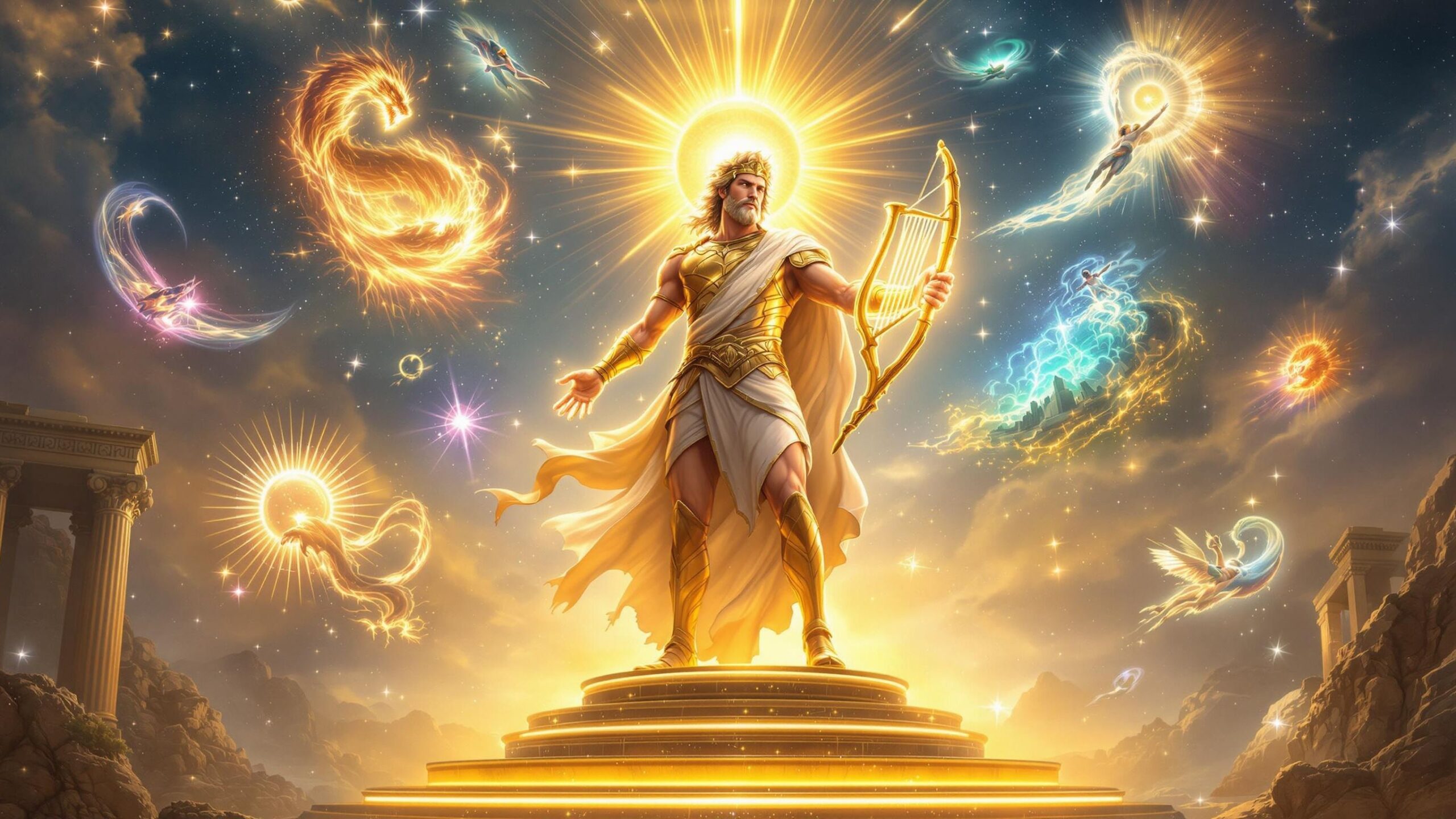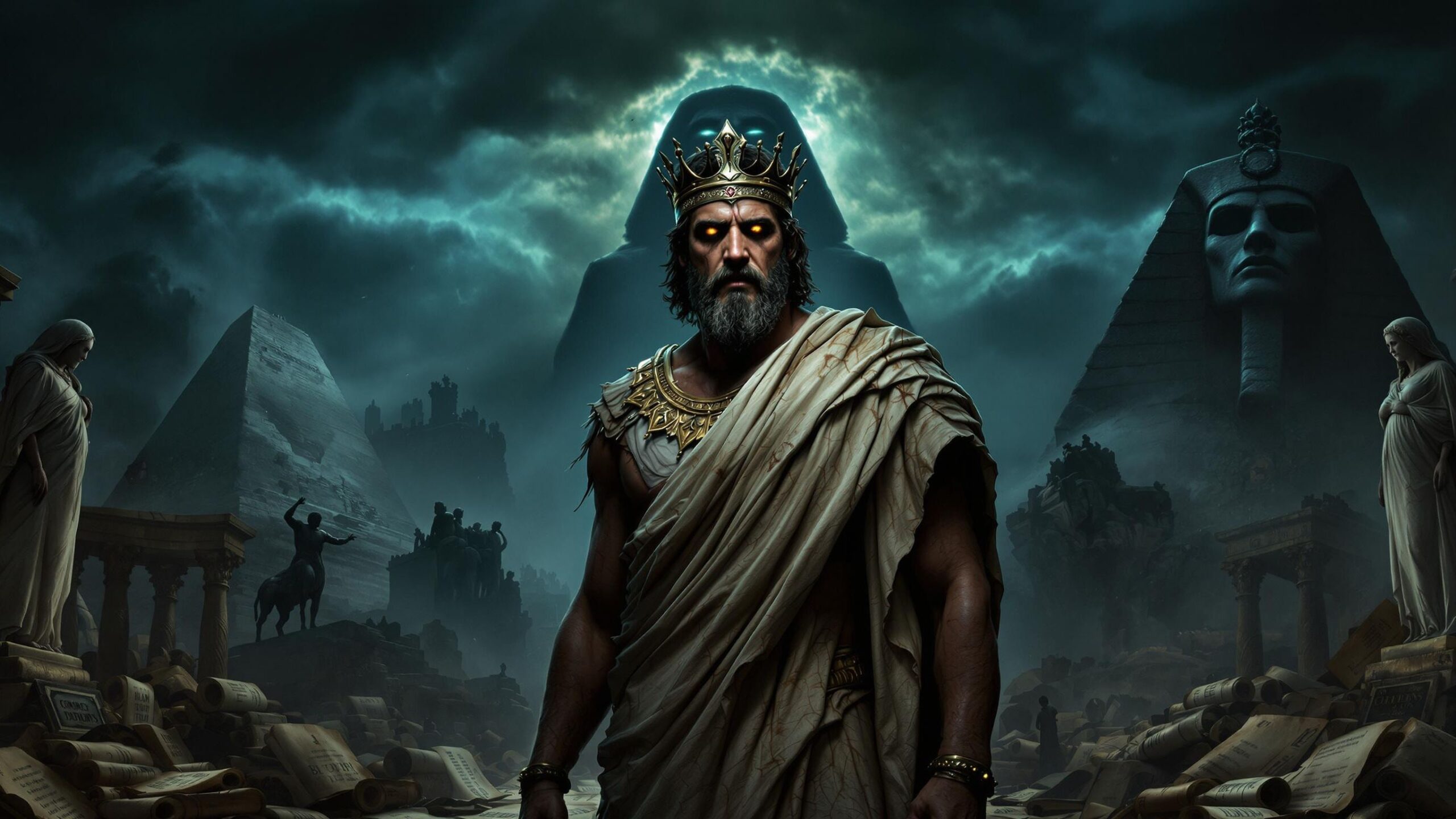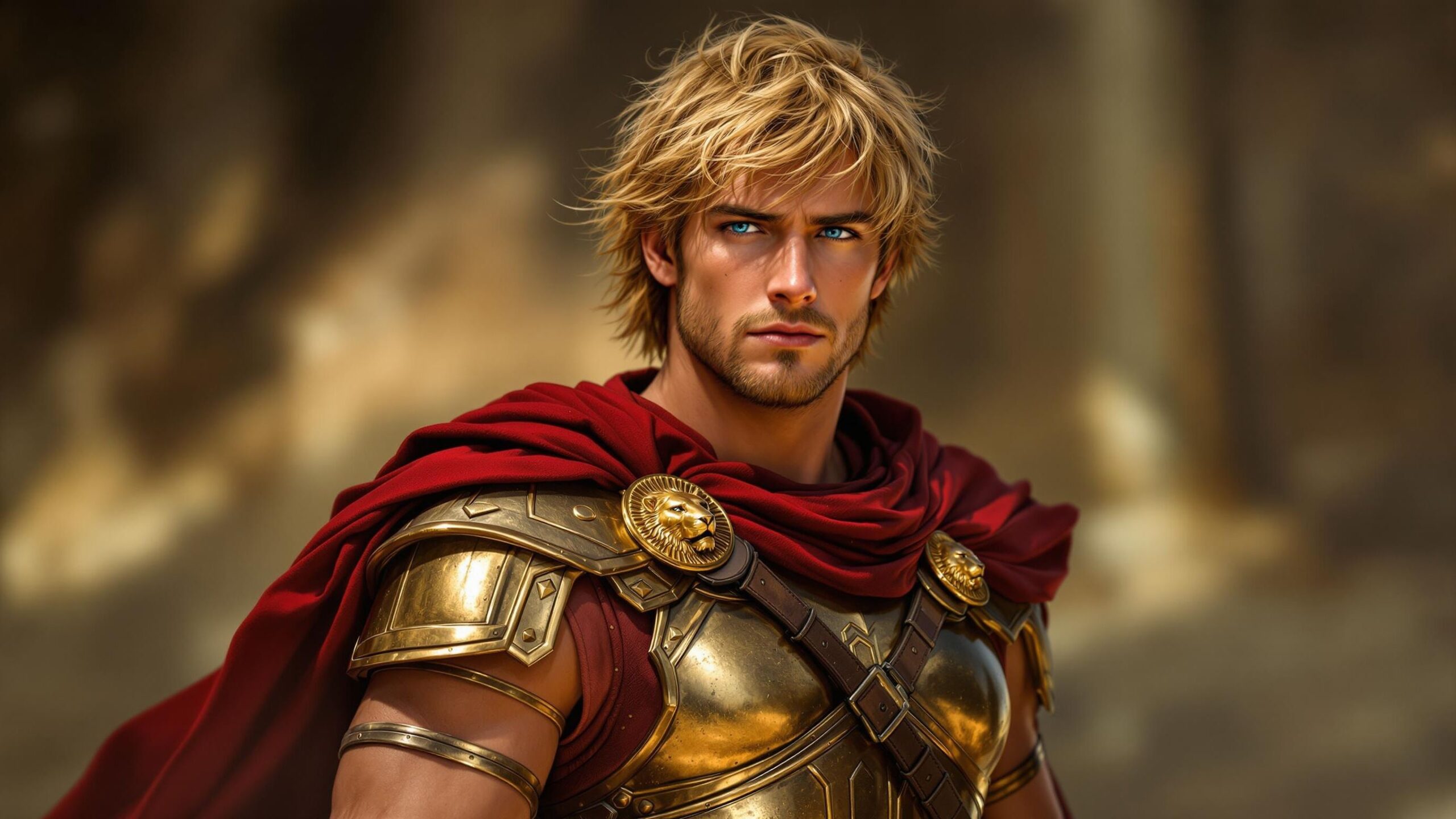In the brutal poetry of Homeric war, strength alone did not guarantee glory—it had to be matched with courage, loyalty, and an unshakable code of honor. No hero embodied these traits more fiercely than Ajax the Great, son of Telamon. Towering, broad-shouldered, and often described as a giant among men, Ajax wasn’t just a warrior—he was a fortress made flesh. While Achilles blazed across the battlefield with fury and divine speed, Ajax was the immovable wall that protected the Greek army, often fighting where the conflict burned hottest. He wielded a massive shield as large as a tower and carried a spear like a tree trunk, and while he lacked the divine lineage of some of his peers, he earned his legacy through unrelenting valor and unmatched martial discipline. From defending fallen comrades to clashing with Trojan champions in single combat, Ajax’s duels weren’t just contests—they were mythic moments that defined the Greek war machine’s resilience. These ten battles reveal the warrior behind the shield and the man behind the myth: powerful, principled, and peerless in combat.
#10: Duel Against the Trojan Shield Wall
Though not one singular opponent, Ajax’s brutal charge against the Trojan shield line after Patroclus’ death stands as one of his fiercest moments. The Trojans, driven by renewed fury, pushed toward the Greek ships in hopes of burning them and breaking the Achaean defense. With Achilles still absent from battle, it was Ajax who stood alone between the burning hulls and the oncoming horde. Towering above his peers, shield slung over his shoulder like a fortress, he plowed through Trojan ranks, striking them down one by one and rallying the Greeks to hold the line. This was no stylized duel—this was a sustained war of attrition, where Ajax’s size, endurance, and fury created a wall no Trojan could breach. He didn’t need divine rage—he had iron resolve. It was this moment that proved Ajax was not only a hero in single combat but a savior in the chaos of mass war.
#9: Ajax vs. Sarpedon’s Guard
When Sarpedon, son of Zeus and one of Troy’s most noble allies, was slain by Patroclus, the battlefield erupted into chaos. The Greeks surged to seize the body, while the Trojans, led by Sarpedon’s elite guard, fought to retrieve their fallen prince. In the center of this violent clash stood Ajax, absorbing spear after spear and hurling death in return. His duel with the defending guard around Sarpedon was relentless. Blow by blow, he tore through the Trojan line with calculated brutality, defending Patroclus’ right to claim the kill and ensuring the gods would not rob the Greeks of their honor. Ajax was more than muscle—he was a moral force, standing for valor and respect even in the blood-soaked mud of war. This was not a duel of names—but a fight for legacy, and Ajax fought it like a titan among mortals.
#8: Ajax vs. Hippotion
While less celebrated than his clashes with Hector or Aeneas, Ajax’s duel with Hippotion showcased his psychological and physical domination on the battlefield. Hippotion, a fierce Trojan fighter, made the fatal error of charging Ajax directly. The Telamonian didn’t just parry the attack—he crushed it. With a sudden sweep of his shield and a bone-shattering spear thrust, Ajax ended the fight in seconds. What stood out wasn’t just the ease of his victory, but the way it sent a ripple of fear through the Trojan line. Ajax didn’t waste time with speeches or flair—he showed that challenging him in open battle was a death sentence. It was a moment that reminded friend and foe alike that while Achilles burned with divine wrath, Ajax burned with cold precision.
#7: Ajax vs. Hektor (Round 2)
During the night raid following Patroclus’ death, the Trojans nearly broke into the Greek camp again. In the darkness, amidst flickering fires and screams, Ajax stood guard near the ships. When Hector led a renewed assault, the two clashed once more. Though their duel was less formal than their first famous encounter, it was just as intense. Ajax hurled stones so massive they cracked shields and left Hector momentarily dazed. Despite the chaos, Ajax focused only on keeping Hector from reaching the ships, his strength like a dam holding back a flood. There was no audience this time, no gods weighing the outcome—just two titans fighting by firelight. It was raw, primal, and beautifully grim. Ajax didn’t need ceremony to shine—he was the embodiment of duty, always where he was needed most.
#6: Ajax vs. Aeneas
Before Aeneas became the hero of Virgil’s Aeneid, he was a prominent Trojan warrior and the son of the goddess Aphrodite. In Homer’s Iliad, he and Ajax faced off in a thunderous clash that showed Ajax’s ability to match—and exceed—men blessed by the gods. Aeneas charged forward with divine backing and burning pride, but Ajax didn’t flinch. He caught Aeneas’ blows on his massive shield, retaliating with the precision of a warrior who had fought a thousand men before. Their duel was brutal and relentless, a war of attrition. Ajax, grounded and unwavering, pushed Aeneas back with sheer force and balance. Though the duel ended in a draw, it was clear that Aeneas had tasted defeat without suffering it. Ajax’s ability to repel a semi-divine hero with such calm confidence elevated his mythic status. He didn’t need tricks or divine intervention—he needed only his shield, his spear, and his iron will.
#5: Ajax vs. Hector (The Duel)
Among all the duels fought before the gates of Troy, none were as balanced, suspenseful, or symbolically rich as the formal one between Ajax and Hector. When Hector challenged the Greeks to send out their champion, nine warriors volunteered. Through drawing lots, Ajax was chosen to represent the Achaeans. The duel between these two titans became a masterclass in Homeric heroism. Ajax was described as towering, nearly unmatched in might, while Hector fought with the urgency of Troy’s last hope. They exchanged mighty blows—spears shattering shields, stones crashing into armor—and the gods themselves watched with bated breath. At the end of the day, neither fell. Out of mutual respect and exhaustion, the duel ended in a draw. Yet, the real victory was Ajax’s. He not only held his own against Troy’s greatest warrior—he earned his eternal respect. That duel was more than a fight; it was a moment when war paused to watch two legends test their souls.
#4: Ajax Defending Patroclus’ Body
After Patroclus fell to Hector, the battlefield became a frenzy of blood as both sides fought over his body. In this most sacred act of warrior loyalty, it was Ajax who rose above all. With Achilles absent in grief and madness, it fell to Ajax and Menelaus to protect their fallen friend’s corpse. But when Menelaus faltered, Ajax took up the defense alone. Surrounded by Trojans, Ajax fought like a god, beating back Hector, Aeneas, and wave after wave of attackers. He planted himself over Patroclus’ body like a mountain, refusing to let any foe desecrate it. His shield became a rampart, his spear a warning. With every thrust and roar, he proclaimed that honor was not dead. It was one of Ajax’s most defining moments—not just for his strength, but for his unshakable loyalty. He didn’t just defend a body—he protected a brother’s soul.
#3: Ajax vs. Glaucus
The duel with Glaucus, though sometimes overshadowed by more famous battles, remains a testament to Ajax’s adaptability and endurance. Glaucus, the Lycian prince and ally of Troy, was known for his sharp spear and nimble tactics. He was no brute—he was a thinker. But even against a more agile opponent, Ajax proved unstoppable. He adjusted his fighting rhythm, switched tactics mid-combat, and pressed Glaucus with relentless strength. Glaucus was eventually forced to retreat, recognizing that Ajax’s power could not be overcome with speed alone. This duel is often cited by later writers as an example of Ajax’s strategic intelligence—a reminder that beneath his massive frame lay a sharp, calculating warrior brain. Ajax was not just power—he was adaptation and experience forged in a hundred battles.
#2: The Defense of the Ships
While not a one-on-one duel in the classic sense, Ajax’s stand at the Greek ships during Hector’s fiery assault was perhaps his greatest battlefield performance. As Trojan torches neared the hulls, signaling imminent doom for the Greek army, Ajax alone turned the tide. He leapt from ship to ship, blocking ladders, slaying attackers, and rallying terrified soldiers. Hector led the charge with a fury that echoed Achilles, but Ajax didn’t back down. In this prolonged clash, Ajax and Hector dueled across the decks with a ferocity that shook the sea. With no time for formalities or speeches, this was war stripped to its essence: survival, strength, and raw leadership. Ajax beat back Hector again and again, saving the entire fleet from destruction. The ships survived, not because of fate, but because Telamon’s son refused to fall.
#1: Ajax vs. Himself—The Final Battle
In what is perhaps the most tragic and deeply human moment of the entire Trojan saga, Ajax’s greatest battle was not fought with a spear, but within his own mind. After Achilles’ death, his armor was to be given to the greatest Greek warrior. Both Odysseus and Ajax made their claim, but the armor was awarded to Odysseus. Ajax, humiliated and overcome by wrath, planned to kill the Greek leaders. But the gods clouded his mind, and he slaughtered livestock instead, thinking them his enemies. When clarity returned, Ajax was horrified by what he had done. He chose to fall on his sword rather than live with disgrace. This act, devastating and profound, was the final duel—a warrior against his wounded pride, against the weight of unrecognized greatness. It revealed the soul behind the shield, the unbearable burden of being the second-best, even when you fought like the first. In this ending, Ajax became immortal—not because he conquered, but because he dared to feel.
Ajax’s story is one of power, precision, and profound humanity. While he never claimed the glory of Achilles or the cunning of Odysseus, he stood where others fell. He defended friends, repelled gods, and faced every duel with the strength of a hundred men and the heart of a true hero. His duels weren’t just contests of skill—they were moral battles, moments when raw might met unwavering honor. And though his end was steeped in sorrow, it was also deeply noble, a final act of dignity from a man who gave everything for his name, his comrades, and his code. These ten duels prove that while Achilles may have been the Greeks’ greatest warrior, Ajax was its greatest shield—unyielding, unforgettable, and utterly heroic.




